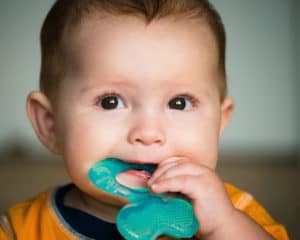What are the symptoms of teething? Does teething cause diarrhea? How can I help a teething baby? In our latest blog post, we provide answers to these questions and some tips for how to help a teething baby. It’s important to be aware that some popular remedies for teething are not considered safe.
 Your happy, squealing 4-month-old has suddenly started drooling and gnawing incessantly on any object that comes within reach, and seems to be fussier than her usual self. You wonder, is this the dreaded teething stage you’ve heard about? What can you do to help your baby, if it is?
Your happy, squealing 4-month-old has suddenly started drooling and gnawing incessantly on any object that comes within reach, and seems to be fussier than her usual self. You wonder, is this the dreaded teething stage you’ve heard about? What can you do to help your baby, if it is?
All typically developing babies enter a “mouthing” stage by 3-4 months of age, accompanied by drooling and an eagerness to explore anything and everything by putting it in their mouths, whether it’s their hands or any other object that comes within reach! This is a normal stage of sensory exploration in children under 2 years of age, and by itself is not a sign of teething.
Teething is a process that begins for most babies between 4 and 7 months of age, and may last until 2 years of age, when the last set of primary teeth erupt. During this process, the teeth (which have been forming in the alveolar bone) begin to travel through the bone and overlying gums into the oral cavity. While some babies may show minimal signs of discomfort, others may be quite miserable! Despite being blamed for a variety of symptoms, teething does not cause true fever (101°F), respiratory symptoms, or vomiting/diarrheal illness. Teething may cause fussiness, gum inflammation and irritation, increased drooling and mouthing behaviors, and mild elevations in body temperature (<101°F).
Teething Relief: Safe Teething Remedies
While many teething remedies may be available, not all are equally safe or effective. When your child is experiencing discomfort from teething pain, try these remedies for relief:
- Natural rubber, untreated wood, or soft silicone teething toys. Some safe options that we like:
- Cold, wet washcloths to chew on (though not frozen solid, to prevent thermal injury to baby’s hands or gums) or a gum massage with a clean finger.
- For infants already eating solids, try offering semi-frozen fruit in a mesh food feeder (e.g. Munchkin’s Fresh Food Feeder).
- For older infants adept at finger foods and table foods, frozen bagels and firm teething biscuits may provide relief.
- If these natural remedies are not enough, a weight-appropriate dose of acetaminophen or ibuprofen (for infants 6 months of age and up) may be helpful. Ask your doctor if this is right for your child.
Are Teething Tablets Safe? – Unsafe Teething Remedies We Do Not Recommend
- Amber Teething Necklaces have been marketed with the claim that they naturally relieve teething pain due to the release of pain-relieving chemicals when the beads warm to body temperature. In addition to a lack of scientific evidence to support this claim, this remedy poses significant risks of both choking and strangulation. Choking or aspiration may occur if the child were to break the necklace and swallow or inhale a bead. Strangulation may occur with any necklace worn around the neck in an infant or young toddler, especially while sleeping or unattended. In general, it is not recommended for infants and young toddlers to wear necklace or lanyard-type accessories, due to safety concerns.
- Homeopathic Teething Gels and Tablets have been under recent scrutiny due to increased reports of seizures, altered mental status, and other complications from excessive amounts of belladonna, a potent natural toxin, in homeopathic teething products. As a result, the FDA has issued a warning to avoid use of these products, and several manufacturers have voluntarily recalled affected products (Note: The FDA does not regulate homeopathic products.) In addition to belladonna, chamomile is commonly found in homeopathic teething products and is associated with an increased risk of botulism spore contamination and infant botulism. Due to these safety concerns, these products should be avoided.
- Over-The-Counter Anesthetic Oral Gels containing benzocaine (e.g. Anbesol®, Orajel®, Baby Orajel®, Hurricaine®, Orabase®) may lead to a rare but life-threatening condition called methemoglobinemia, in which the oxygen-carrying capacity of the blood is severely reduced. Young children appear to be particularly at risk for this complication, and the FDA issued a warning to avoid their use in children less than 2 years of age.
Final Words
While teething can be a trying time, it doesn’t last forever, and soon enough she’ll be using those teeth to explore new foods, textures, and sounds! Don’t forget – once your baby develops teeth, it’s the perfect time to start brushing them!
For more information on normal timing of tooth eruption, check out the American Dental Association’s MouthHealthy.Org tooth eruption chart.
Note: The information contained in this article has been provided as general health information and does not constitute specific medical advice for your child.
 33 Rock Hill Rd
33 Rock Hill Rd 1740 South Street
1740 South Street 2365 East York Street
2365 East York Street